学科分类号
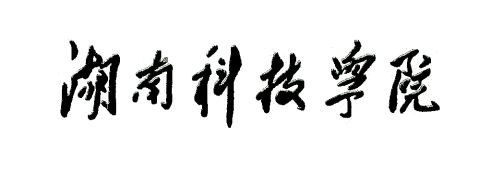
本科学生毕业论文(设计)
题目(中文)
(英文):Self-esteem And Struggle – Appreciating the
姓 名 学 号 院 (系) 专业、年级 英语专业2003级
指导教师 潘利锋
20xx年 5月 25 日
Self-esteem and Struggle
Appreciating the Tragic Hero Ahab in Moby-Dick
by
Zhang Jianguo
supervised
by
Professor Pan Lifeng
submitted
to
The Foreign Languages Department
In partial fulfillment of the requirements
for the degree of
Bachelor of Arts
in the subject of
English Language and Literature
Hunan University of Science and Engineering
Yong Zhou
May, 2007
湖南科技学院本科毕业论文(设计)诚信声明
本人郑重声明:所呈交的本科毕业论文(设计),是本人在指导老师的指导下,独立进行研究工作所取得的成果,成果不存在知识产权争议,除文中已经注明引用的内容外,本论文不含任何其他个人或集体已经发表或撰写过的作品成果。对本文的研究做出重要贡献的个人和集体均已在文中以明确方式标明。本人完全意识到本声明的法律结果由本人承担。
本科毕业论文(设计)作者签名:
二○○ 七 年 五 月
一、湖南科技学院本科毕业论文(设计)开题报告书
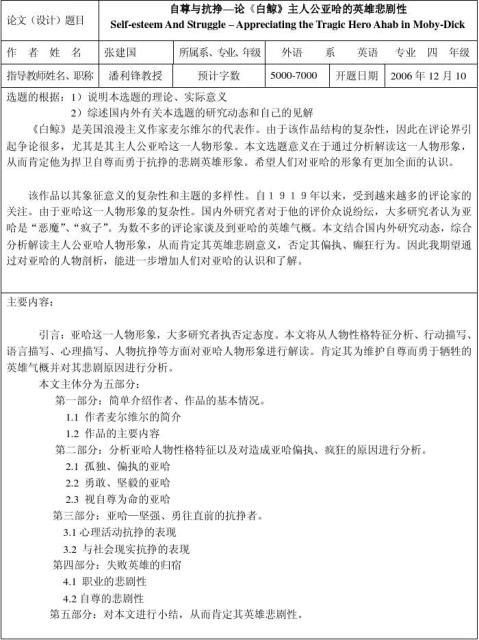
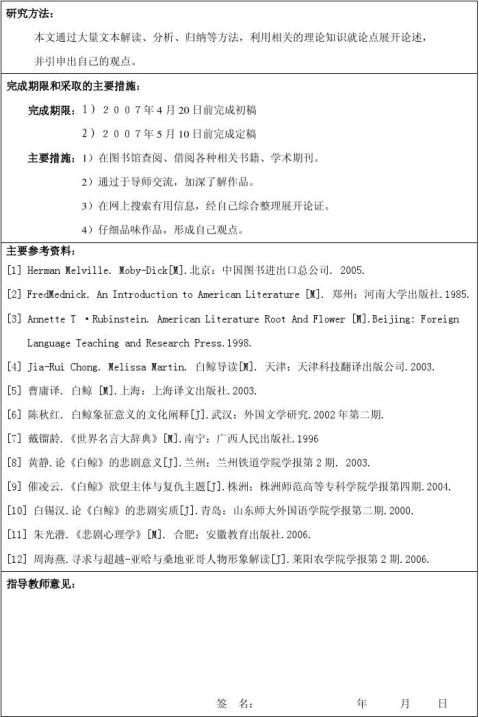
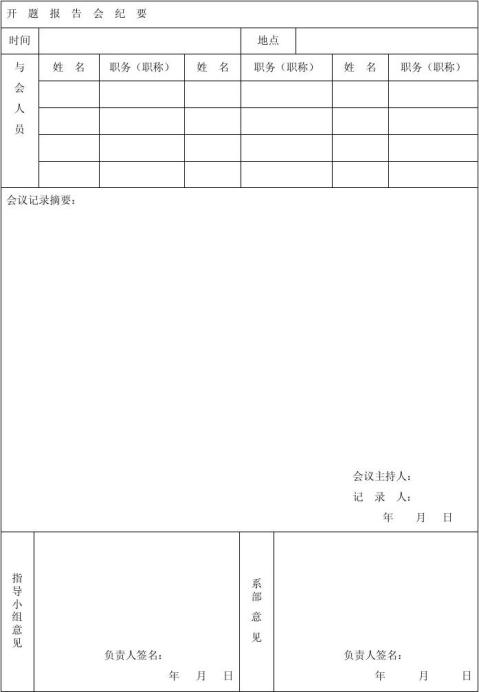
二、湖南科技学院本科毕业论文(设计)评审表
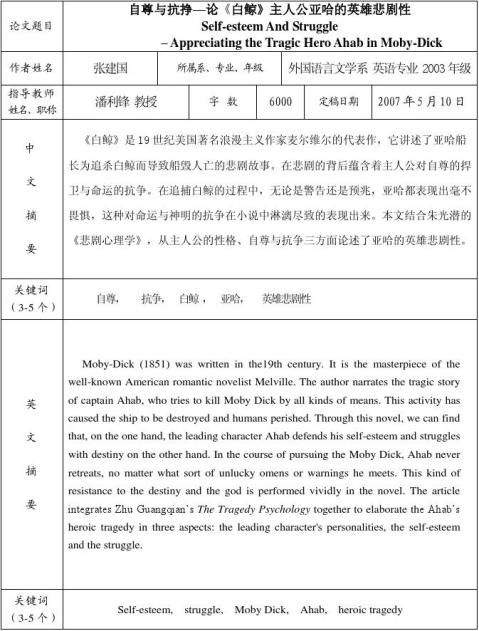
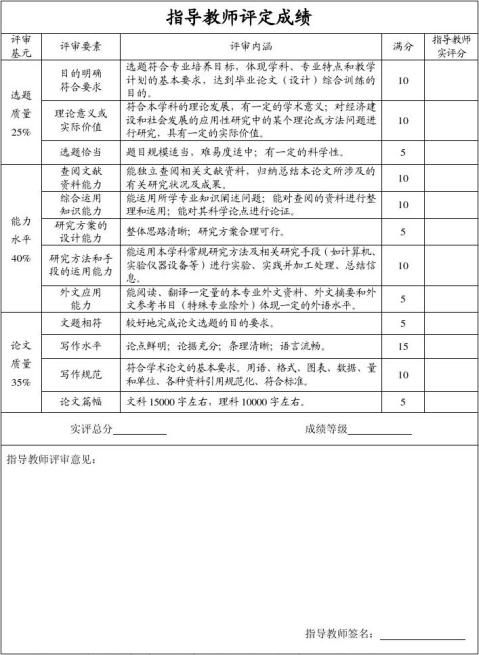
优秀,80—89分记为良好,70—79分记为中等,60—69分记为及格,60分以下记为不及格。
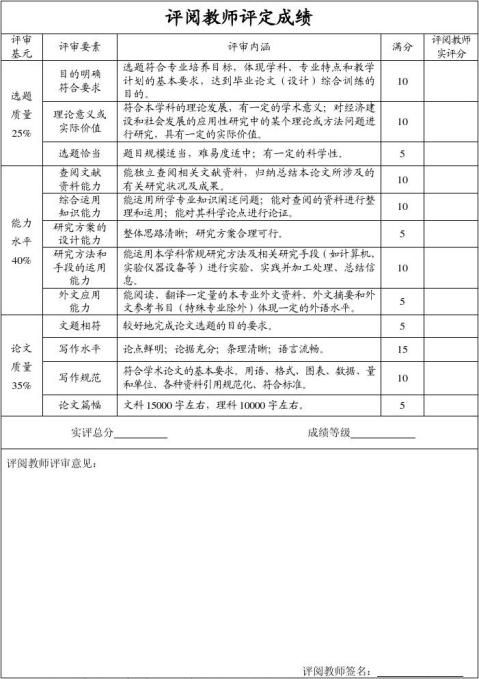
优秀,80—89分记为良好,70—79分记为中等,60—69分记为及格,60分以下记为不及格。
三、湖南科技学院本科毕业论文(设计)答辩记录表
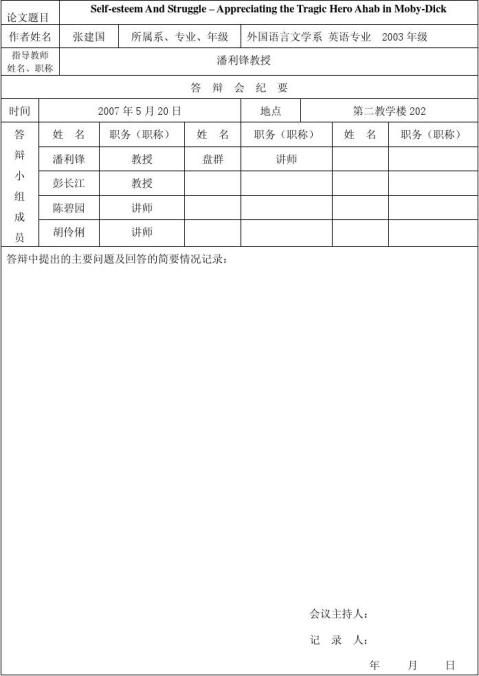
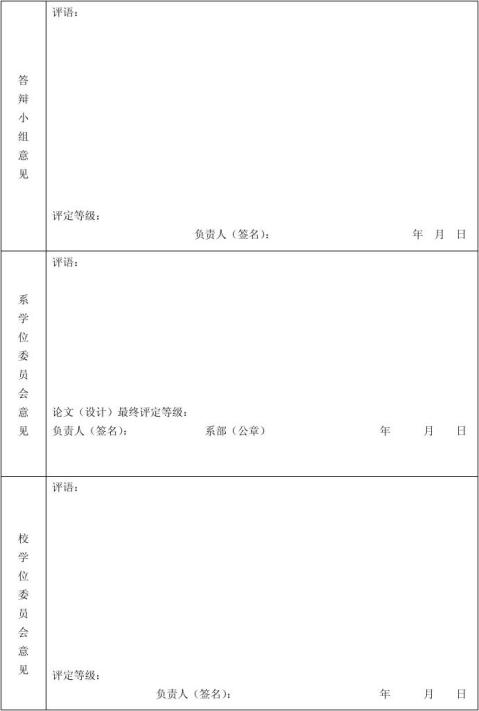
Contents
摘要…………………………………………………………………....Ⅰ Abstract ……………………………………………………………....Ⅱ
1. Introduction ………………………………………………………...1
2. Melville and His Moby-Dick………………..……………………....5
2.1 Brief Introduction of the Author ………………………………...5
2.2 Main Content of Moby-Dick……………………………….……6
3. The Personality of Ahab …………………………………..…........8
3.1 A Lonely and Crazy Hero–Ahab ……………………………......8
3.2A Brave and Resolute Hero –Ahab ……………………………..11
3.3 Regarding the Self-esteem as Life ……………………………...14
4.The Performances of Struggle…………………………..……........17
4.1 The Performances of Struggle on Psychological Activity………17
4.2 The Performances of Struggling with the Society…….. ……....19
5.The End of the Unsuccessful Hero………………………….….....23
5.1 The Occupational Tragedy ……………………………………..23
5.2The Tragedy of Struggle with Fate………………………….…..25
6. Conclusion…………………………………………………………29
Notes…………………………………………………………………..31
Bibliography……………………………………………………….....32 Acknowledgements
摘要
《白鲸》是19世纪美国著名浪漫主义作家麦尔维尔的代表作,它讲述了亚哈船长为追杀白鲸而导致船毁人亡的悲剧故事。在悲剧的背后,蕴含着主人公对自尊的捍卫与命运的抗争。在追捕白鲸的过程中,无论是警告还是预兆,亚哈都表现出毫不畏惧,这种对命运与神明的抗争在小说中淋漓尽致地表现出来。本文结合朱光潜的《悲剧心理学》,从主人公的性格、自尊与抗争三方面论述了亚哈的英雄悲剧性。
关键词:自尊, 抗争, 白鲸, 亚哈, 英雄悲剧性
Abstract
Moby-Dick (1851) was written in the19th century. It is the masterpiece of the well-known American romantic novelist Melville. The author narrates the tragic story of Captain Ahab who tries to kill Moby Dick by all kinds of means. This activity has caused the ship to be destroyed and humans perished. Through this novel, we can find that, on the one hand, the leading character Ahab defends his self-esteem and struggles with destiny on the other hand. In the course of pursuing Moby Dick, Ahab never retreats, no matter what sort of unlucky omens or warnings he meets. This kind of resistance to the destiny and the god is performed vividly in the novel. The article integrates Zhu Guangqian’s The Tragedy Psychology together to elaborate the Ahab’s heroic tragedy in three aspects: the leading character's personalities, the self-esteem and the struggle.
Key words: Self-esteem, struggle, Moby Dick, Ahab, heroic tragedy
1
Introduction
The theme of tragedy is of vital significance in the world literature and has been vividly represented and frequently discussed in the development of the tragic literature.
Regarding the tragic literature, we can trace back to Greek. We would find that the theme of tragedy is popular in any period, and Moby-Dick is a typical tragic novel among those literatures. Moby-Dick is the masterpiece of Melville, the well-known American romantic novelist in the 19th century. Moby-Dick was published in 1951.Because of the multiplicity of the themes and the complexity of the structure; it had received numerous critics' severe judgments and censure when it came out. Athenaeum of London, ever stated that
"Moby-Dick belonged to the Bedlam literature of the worst school” [1] (p458)
Henceforth no one has ever mentioned it and Moby-Dick is neglected in the literary arena.
Not until the anniversary of Melville's 100th birth, people began to value this book again. This time, it became the generally acknowledged masterpiece, and was praised as the symbol of the epoch. In 1917, Carl · Van Doren declared in The Cambridge History of American
Literature that Moby-Dick was ―one of the greatest ocean legendary novels in the literature of the whole world‖, which had been a great evaluation to the book. In Psychology and Literature, Carl G Jung believes that Moby-Dick is one of the greatest American novels. Obviously, we can know that the Moby-Dick has wined the high place in American literature.
At present, many people have done some researches into Moby-Dick such as Huang Jing’s the tragic significance of the whale, Bai xi-han’s on tragic essence of Moby-Dick, Cui Ling-yun’s Moby-Dick: Lust and Revenge. But they mainly stay on the study of the symbolic significance and the tragic conduct with fewer analyses on Ahab’s self-esteem and struggle to destiny. They give a negative attitude towards what Ahab has done. They have ignored that losing face leads to all of Ahab’s crazy activities. In The Culture Interpretation of the Symbolic Significance in Moby-Dick Chen Qiuhong has mentioned that Ahab is a hero whose self-esteem cannot be conquered. Nevertheless, she did not make a further study on it. This paper is aimed to analyze and appreciate Ahab’s belief to self-esteem and struggle through his personality, behavior description, language description, and psychological description.
This article will base on two aspects of the leading character Ahab: one is that he defends the self-esteem and the other is that he struggles with fate. At the same time, I refer to Zhu Guangqian's Tragedy
Psychology to elaborate Ahab's heroic tragedy. In part one I give a brief introduction to the whole paper. In part two, I will give a brief introduction of the author and Moby-Dick. Therefore, readers will be able to understand the writer and his works easily.
The part three is focused on analyzing the leading character’s personality. It is the personality of the leading character that leads to the tragic end. Through Ahab’s behaviors and words, it is clear that he struggles with destiny and defends his self- esteem at all time. This chapter would help the readers know about Ahab in a new way. At the same time, it helps to explain why Ahab becomes a crazy man.
The part four would talk about the performances of struggle. It includes two aspects, namely, the performances of struggle on psychological activity and the performances of struggle with the society. From this chapter, we would know that Ahab is a real hero who is never willing to be controlled by the fate and bow to his enemy.
The part five would discuss the result of the struggle. Every year, thousands of whale men are buried into the sea. This novel is also an example of the occupational tragedy. While facing the powerful enemy, Ahab never thinks of shrinking from it. At last, he is buried into the sea to which he has devoted all his life. In this way, Ahab finally releases himself. At the same time, it leads to another tragedy--the tragedy of struggling with fate.
The part six would conclude the whole paper. Ahab is doomed to be a tragic figure. However, it is Ahab who dares to sacrifice himself, and dares to enterprise, that we are able to understand more about nature. From this thesis, we would know that Ahab is a greater man with a notable spirit. Meanwhile, he is also a tragic hero.
.
2
Melville and His Moby-Dick
Herman Melville is the well-known American romantic novelist in the 19th century. If we want to know about the tragic hero –Ahab in Moby-Dick we have to refer to Melville whose life is full of tragedy. That’s why most of his works are filled with a strong tragic color. His life is unsuccessful, but he has left the great works–Moby-Dick to the human beings. The tragic life of the author is doomed to portray his works with tragic color
2.1 Brief Introduction of the Author
Herman Melville (1819-1891) was born in a family that enjoyed good reputation in New York. When he was young, he had received a good education, as his family was rich enough at that time, thus he was able to go to the best schools. But when he was 12 years old, his father became insolvent and died soon because of the illness caused by anxiety. He had to drop out of school halfway, and threw himself into the society at an early age. To escape the poverty, Melville was forced to start the severe voyage life in 1837. The four years’ experience on the sea has widened his view and enriched his thought, which provides an inexhaustible source of materials for his future literature creation. That is
why most of his literatures are related to the sea. It is the sea that gives birth to this great writer. No wonder he calls his four-year voyage career as his‖ Yale University" and "Harvard University". Therefore, Melville has a deep affection to the sea. He has written successfully The Typee(1846), Omoo(1847), Mardi(1849), White-jacket (1850), Moby-Dick (1851) , The confidence-man(1857), among which Moby-Dick is his representative writing. This works merges Shakespeare's tragedy and romanticism into an integral whole. It has been recognized as one of the masterpieces in the world literature treasure-house.
2.2 Main Content of Moby-Dick
Moby-Dick (1851) is the masterpiece of Melville, the well-known American romantic novelist in the19th century. With the great vehemence of the tragic epic and the tragic artistic conception of Shakespeare, Moby-Dick molds a heroic tragedy character—Captain Ahab, who is a grand, ungodly, god-like man. The leading character of the novel Ahab lost a leg when he encountered Moby Dick, which seemed to be a great shame to him. So he pledged that he would spare no effort to take revenge on it. At that time, people believed that man was the master of his own fate. Therefore, Ahab started his crazy revenge in order to save his self-esteem. From then on, this difficult mission had become the only pursuit of his life. In order to achieve this goal as soon
as possible, Ahab began to search the whereabouts of Moby Dick the moment he went out to sea. He tried all kinds of means to find it out. Meanwhile, he made all sailors obey his will by various ways. Ahab realized clearly that he would have to pay a heavy price for this. However, he still made up his mind that he would rather die than live in dishonor. With great courage and dedication, Ahab tried his best to fulfill his mission without hesitation. No matter who begged him to stop, no matter what obstacles he had met on the way, Ahab still insisted on his goal. In the end, all the people were buried into the sea except Ishmael, who narrated the whole story as an experienced person. And Ahab finally found out his own destination of spirit by the way of perishing together with Moby Dick.
3
The Personality of Ahab
Many critics have done researches on Moby-Dick. But they all believe that Ahab is a demon, a crazy man, because they just analyze Ahab from his crazy activity in pursuing Moby Dick, which is only a small part of Ahab. They have ignored Ahab’s inner personality. Ahab is a man who would never bow to fate and takes self-esteem as his life. He believes that a person can be killed, but he can’t lose his self-esteem. This chapter will focus on appreciating Ahab’s personality comprehensively.
3.1 A Lonely and Crazy Hero –Ahab
Heroes are always lonely, and Ahab is no exception. He is incompatible with the surrounding world, and always silent and speechless. The brutal reality and the hierarchical system had imprisoned him so firmly in the whaling ship that he could not get out of this narrow space. However, when Moby Dick took away one of his legs, Ahab became even more eccentric because of the kind of physical destruction and mental torture made by it. To take revenge, he made up his mind to leave his only daughter and his wife who had been married to him for ten years. Thus, he started the miserable navigation just as: "trying to find a needle in a haystack". During this long voyage, what had brought to him
were only the suffering of torment and the endless mental torture. In the bottom of his lonely heart, a kind of helplessness also revealed, which made him feel even worse. In such case, Ahab had to pour out these innermost pains, which had piled up in his heart for so many years.
" Forty- forty- forty years ago! -ago! Forty years of continual
whaling! Forty years of privation, and peril, and storm-time! Forty years on the pitiless sea! For forty years has Ahab forsaken the peaceful land, for forty years to make war on the horrors of the deep! Aye and yes, Starbuck, out of those forty years I have not spent three ashore. When I think of this life I have led; the desolation of solitude it has been; the masoned, walled-town of a Captain's exclusiveness, which admits but small entrance to any sympathy from the green country without- oh, weariness! heaviness! Guinea-coast slavery of solitary command! ---What a forty years' fool- fool- old fool, has old Ahab been! Why this strife of the chase? Why weary." [2] (p761)
For Ahab, 40 years’ whaling life had made him feel tired of life and helpless. He could feel the inner loneliness, anxiety, self-doubt, while all these were a hero's lonely cry with wails. Moby Dick was just like an invisible wall. It had imprisoned stubbornly this old person above the vast sea, while this pitiful man had already experienced quite a lot. For many
times, Ahab closed himself in the captain cabin and thought about how to take revenge to Moby Dick. Under such circumstances, how can one let the old captain not feel wretched and helpless?
Due to the pain caused by the loss of the leg, Ahab could not walk out of the humiliation of loss of dignity; even the pipe could not lessen any of his pain. It looked as if the artificial limb, which was made by Moby Dick, frequently reminded him that he had been defeated by it. At that time, the concept of ―man can conquer nature‖ was widely accepted by people. Therefore, the loss of the leg caused by Moby Dick was undoubtedly a great shame to Ahab. Thus, revenge inevitably became the only outlet of Ahab’s life and killing Moby Dick had been the only meaning of his life in this world. Any unlucky omens, warnings and plea could not change his determination to kill Moby Dick and prevent him from taking revenge. On the contrary, he became even more determined about his goal.
“Now, in his heart, Ahab had some glimpse of this, namely; all my
means are sane, my motive and my object mad.” [3] (p261)
It is mainly because of this kind of motivation and crazy purpose, some horrible power reveals in Ahab—craziness. What he said and what he did eloquently demonstrated his paranoid personality. When Starbuck
told Ahab that the fire on his javelin meant that god was against him, and persuaded him to give up the goal of killing Moby Dick, Ahab cursed Starbuck loudly. He shouted that anyone who dared to lax the rope end would be pierced by his javelin. In Ahab's eyes, all the crew must take the task of killing Moby Dick as their sacred responsibility, from which we can see that Ahab has imposed his own will on others in order to complete his mission. He regards the lives of the sailors as valueless as grass. From the very beginning, Ahab has pledged,
“I?ll chase him round Good Hope, and round the Horn, and round
the Norway Maelstrom, and round perdition's flames before I give him up." [4] (p227)
Ahab understands that it is impossible for him to stop the crazy pursuit; because he could not .And also it is impossible for him to bow to his fate. The only outlet is to try to retrieve his dignity by this kind of crazy revenge.
3.2 A Brave and Resolute Hero –Ahab
Among Ahab’s personalities, he has the side of a paranoid and crazy man, but he is also a brave, strong-determined hero. However, it is obvious in the novel that, while struggling with fate, Ahab’s really
powerless. His revolt will inevitably lead to his and all the crew's destroy. To some extent, this kind of destroy undoubtedly means that Ahab is able to be free from the mental torture forever.
"He has forsaken the peaceful land for forty years, and made war
on the horrors of the deep for forty years! He has a notable spirit"[5] (p336)
He has experienced all sorts of hardships, but he is always full of spirit and fights bravely without fear. Ahab owns the indomitable spirit of the human beings, just as what Emerson writes in the Heroism,
"The hero cannot be mediocre; mediocrity could never become the
hero." [6] (p720)
During the time when Ahab fights with Moby Dick, he has shown the spirit that he will never give up his mission. No matter what kind of whaling ship he has met, he will inquire about the whereabouts of Moby Dick. He travels all over the world while his only aim is to seek Moby Dick, and then eliminate it at any cost.
In the process of killing Moby Dick, Ahab’s goal is clear, his manner is firm and his determination is faithful. In order to achieve his goal, everyday he only lies down on bed for three hours. He always wonders about how to find out Moby Dick. He looks at the chart, observes the sun and studies the route in the captain's room. Any place Moby Dick might appear, Ahab will see to it and never miss the chance to kill it. However, Moby Dick has a kind of mysterious and supernatural force. At that time, it is impossible for people to get to know Moby Dick. Therefore, Ahab must, first of all, have the courage and perseverance to endure all sorts of unfortunate things in this struggle. And then he is able to fight with a much more powerful enemy to defend his own dignity. Ahab dares to break the convention to eradicate Moby Dick, which is much more powerful than him. It forms a sharp contrast with the Christian coward -- Starbuck. While facing the powerful Moby Dick, Starbuck has chosen the method of a step-by-step concession. In the course of struggling with Moby Dick, we can see his retreat everywhere. But Ahab displays that he dares to do whatever he wants to do.
"I'd strike the sun if it insults me." [7] (p229)
This kind of courage to challenge the god and the fearless spirit of Ahab has made the human beings deeply shocked. From the very
beginning to the end, Starbuck never stopped persuading Ahab to give up the goal of attacking the white whale, "Even now it is the third day, now it is not too late to give up yet." Ahab understood that he would have to pay a heavy tax for his revenge. However, at this time, it had been impossible for Ahab to abandon this mission. After learning the position of Moby Dick, in spite of all the other people's attempts to dissuade him, Ahab still sailed against the wind and dashed to the point of the sea where Moby Dick appeared. The inner conflict got out of his hand with the approach of Moby Dick, but Ahab still made unremitting efforts to challenge it and tried his best to beat it down. Finally,Ahab fulfilled his long-cherished wish: killing Moby Dick for revenge. He found his spiritual destination in the end. In the face of misfortune, Ahab's heroic spirit shows us human’s great faith and noble spirit.
3.3 Regarding the Self-esteem as Life
Before Ahab lost one of his legs, depending on his courageous, quick-witted and tenacious devotion, he had become a brave and resourceful, resolute captain in a whaling ship, without having to scruple about anything. However, when Moby Dick got away one of his legs, it gave him not merely the physical pain. More importantly, it was the suffering of the spirit and the feeling of the defeat of self-esteem that had hurt Ahab very much. Because of the hatred of losing his leg, it has been
very hard for Ahab to raise his head to re-examine himself with self-esteem. Captain Ahab is superior to others. Undoubtedly, to Ahab, the self-esteem is even more important than his own life. Mustai Karim once said:
"Once a person loses his self-esteem, he would not be a man but a
creepy ghost." [8] (p1583)
Therefore, Ahab should fight for his self-esteem. Thus he is seized by a fanatical desire for revenge. Whaling is no longer his goal, his real aim is to kill Moby Dick and restore his self-esteem. Just as what Chen Qiuhong writes in The Culture Interpretation of the Symbolic Significance in Moby-Dick,
"He has suffered setbacks again and again, but he will never be
defeated. The fire of life can be put out, but his self-esteem will never be conquered. " [9] (p99)
Therefore Ahab pledged that he would go to every place of the world to find Moby Dick out and kill it, in order to eliminate the shame it had brought to him. Zhu Guangqian believes that, in tragedies, the sense of dignity is as important as the idea of fate. If there is no break, no
struggle for disasters, there will be no tragedy. So Moby Dick is just like a magnet which attracts Ahab’s unwavering resistance.
4
The Performances of Struggle
Ahab’ life is unfortunate. During the forty years of whaling life in the sea, he has experienced nearly all kinds of hardships in the world. Whether he should continue to pursue Moby Dick or not has troubled him all the time. Different kinds of tortures are always together with him which has made him feel rather painful. But a hero is also a common people. He has always struggled with his inner conflict. At the same time, he persists on resisting the fate and gods.
4.1 The Performances of Struggle on Psychological Activity
In Moby-Dick, Herman Melville has portrayed the heroic image of Prometheus who runs to control his own fate. Captain Ahab the supreme commander of the ―Pequod" whaling ship, is lonely and contradictory in the bottom of his heart. After going out to the sea, for a long period of time, he refused to see any people like a proud Lama and hid himself in the captain’s cabin which resembled the "grave". For him, there is quite a long distance between him and happiness. Only loneliness can soothe the wound in his deep heart. In this way,he appears to be more superior to others and more mysterious. After being taken away one of his legs by Moby Dick, Ahab still did not abandon the navigation and was not
willing to return to the tranquil land. On the contrary, he started his frenzied revenge. The process of revenge is the process of struggle in his inner world. Ahab has become more and more complex and lonely.
In the chapter of Pipe, the struggle in Ahab’s inner world is vividly performed. This Khan and king of the sea who has struggled with the sea for forty years is really pitiful at this moment.
"This smoking no longer soothes. Oh, my pipe! Hard must it go with
me if thy charm be gone! Here have I been unconsciously toiling, not pleasuring. “ [10] (p181)
For Ahab, whose heart was full of hatred, smoking could not relieve the pain any more,but even gave intense distress. As pipe represented a kind of the peaceful and quiet life, he therefore threw his pipe into the sea. In the last chapter, Starbuck still persuaded Ahab to give up his pursuit, for his young wife and his only child were waiting for his return. Ahab was moved by what Starbuck had said, but he still deserted the idea of returning to the quiet and peaceful continent. He firmly believed that killing Moby Dick was the only way to be rescued. So he cut himself off from the common world of human beings. Thus he is doomed to be destroyed.
In chapter 135, this kind of innermost resistance appeared to be even more obvious. Ahab narrated the misery journey of his own life to Starbuck. When he mentioned his wife and daughter who were quite far away in the hometown, Ahab could not help feeling sad from the bottom of heart. He didn’t know whether he should give up or continue to capture Moby Dick. Ahab’s innermost contradiction was just as painful as those vultures were gorging on his body. Facing the reality, this old person only had to make a choice. He missed his family members, but the pains and torments brought forth by Moby Dick could not be erased from his life. So the only means was to carry on the struggle with Moby Dick to the end, until he had wiped the miserable memory out thoroughly. Finally he broke through the bunch of pressure, and perished together with Moby Dick.
4.2The Performances of Struggling with the Society
"What I've dared, I've willed; and what I've willed, I'll do! “[11] (p235)
In Ahab’s eyes, Moby Dick is not merely the old enemy of his body, but also the old enemy of his spirit. He does not hesitate to struggle with Moby Dick -----the evil conduct in his opinion, though he has been covered with a mass of bruises. Ahab has the explicit goal and faithful
determination. During the process of his revenge, though Ahab has the thought and the wisdom to instruct him, there is a kind of sub consciousness and instinct which summons him to carry out his mission. In his eyes,
" every thing has not supposed to be so difficult that we can not to
be able to achieve in this world, so long as we doesn?t fear to pay for the price…I will never beg to the powerful enemies, just like the schoolboys do to the stronger gangsters. I will never say to the gangsters that you should take some one of your own size, don?t just tyrannize me! No, ye?ve knocked me down, and I am up again…So long as you exist, I can attack you without hesitation. I have already prepared for all. "[12] (p236)
Obviously,Ahab doesn’t believe in the arrangement of fate. He doesn’t believe that nature and all the things are controlled by the god, either.
While facing the formidable enemy, he does not compromise at the slightest degree. Ahab firmly believes that relying on his strong will and the spirit of defiance of the sacrifices; he can defeat the formidable opponent. We may see the evil omens of the thunder and lightning in the works. But even so, they cannot prevent Ahab’s will from struggling with Moby Dick.
Ahab is a man who is not willing to be controlled by the fate and who will never bow to his own fate. With a quite strong will and determination, he bears all sorts of misfortunes. There is a kind of inviolable dignity on his cool face that is full of wrinkle.
Ahab's resistance first manifests in the struggle with the god, which is just as what Father Mapple says,
"If we obey God, we must disobey ourselves; and it is in this
disobeying of ourselves, wherein the hardness of obeying God consists."
[13](p60)
Ahab chooses to disobey the god and follow his own will for he realizes clearly that he has to take human being’s self-esteem as his life. Therefore, he plainly declares that he is the master of his own fate and soul. He denies that the god masters the fate of human beings.
“If man will strike, strike though the mask! Talk not to me of
blasphemy, man; I'd strike the sun if it insulted me. " [14] (p229)
Obviously, Ahab denies that the god restricts the freedom of human beings and the development of pursuing the personality. He hopes to see the world’s original appearance clearly.
Although he never stopped struggling with fate, despising the gods and encouraging the individuality, the irresistible strength of nature had swallowed all the people that struggled with it by billowy waves. Some people died in the tide, some died in shallow waters, and some died in the floods. Therefore, Ahab knew that he was doomed to die in the waves. This is his life, which has already been doomed in advance. So Ahab tries all his efforts to kill Moby Dick to save his self-respect until the last minute. When Moby Dick rushes onto the bow, Ahab is doomed to be defeated by the fate .he is finally buried into the sea, to which he has devoted his whole life. Ahab finishes his tragic result in the end. Although destiny may destroy the great person, it is unable to destroy the human’s loftiness.
5
The End of the Unsuccessful Hero
Tragic author has written the tragic works; the tragic works describes the tragic figure; the tragic figure produces the tragic ending. Though facing the destiny, god as well as the supernatural power, Ahab has never retreated but to struggle with them actively. Eventually, he has directed a dramatic tragedy. His tragedy is not only a kind of occupational tragedy, but also a kind of tragedy of struggle.
5.1 The Occupational Tragedy
In the 19th century, whaling was an extremely dangerous profession. Mostly, only the people who were in the desperate situation were willing to take this occupation, as they might easily be buried into the sea. In fact, they had abandoned their lives; they also had sold their souls to ship owners and the sea. At that time, the material and technical conditions were not very advanced, so the whaling relied entirely on physical strength, and people were only able to be lucky dogs with the help of experience. Every year, thousands of whale men disappeared in the sea, leaving only their lonely relatives.
"So many are the unrecorded accidents in the fishery” [15] (p50)
The conditions of the whale men were very poor. They ate roughage and drank the seawater. The novel has showed a bleak scene to the readers at the beginning of this works, while graves can be seen everywhere.
“Death is easily to happen in the business of whaling----a
speechlessly quick chaotic bundling of a man into Eternity. [16] (p51)
Although Ahab is the captain of the "Pequod" and has enough sailors and shipmen to be dominated on hand, they all work for the owner of the "Pequod", including Ahab himself. The reward of the ultimate cost with their lives is only a very small part of the profits in whale oil. Each drop of the whale oil contains a drop of blood. It is obvious that life is used as stake while engaging in the hunting of whales.
In Ahab’s 40 years of whaling life, undoubtedly, he struggles with the god of destiny at every turn. A soldier who dies in a battle is a tragedy; a sailor who is buried into the sea is also a tragedy. But they have one thing in common, that is an occupational tragedy. I think this job’s tragedy (whaling’s tragedy) has hidden a much deeper significance. That is the exploration of nature and the pursuit of truth.
Because the universe has the unknown side to human beings and the vast nature also has its own fixed rule, Humans are not able to explain the
mystery with the existed scientific and technological achievements. Moby Dick is a good example. It seems to be separated by veil, which makes it impossible to be understood by human beings. It is just because of the unknown side of the nature, people going in for whaling need to pay a heavy cost.
"Tragic figure has been punished, not because any individual has
committed a sin, but due to the ?original sin? that is the very survival of this sin." [17] (p347)
From this it can be seen that survival is the most important thing for each life. While all the human beings existing in this world, they have to face a series of conflicts such as ends and means, hope and reality. The human beings have always been found to struggle with the social reality, however, they also have to fight against nature. The navigation of whaling ship is just the process in which human beings struggles with the nature in order to exist in this world. The sinking of the "Pequod" indicates the final tragedy of this occupation.
5.2 The Tragedy of Struggling with Fate
Ahab is a typical tragic figure. From the very beginning, the novel has laid out the color of this tragedy. The name of Ahab comes from the
Bible. He is the seventh king of Israel, and he is a heinous person at the same time. While fighting with another king, Ahab is killed. So the name of Ahab can be easily associated with tragedy by readers.
Ahab's death is inevitable, Ahab himself is also well aware of this. He has realized the supernatural power of Moby Dick.
"I see in him outrageous strength, with an inscrutable malice
sinewing it." [18] (p229)
People think that Ahab is a mad man and a person who has been affected with paranoia. Undoubtedly, he has been fainting with the desire to kill Moby Dick. But he is a clear-headed madman. He becomes crazy because he considers his dignity insulted. Therefore, he has to safeguard human beings’ dignity, but with a crazy manner. That is trying every means to kill Moby Dick. Just as what Ernest Hemingway has ever said,
"A man can be destroyed. But he cannot be defeated".[19] (p68)
Ahab can only vent his pain of losing the self-esteem through pursuing Moby Dick crazily. Zhu Guangqian writes in The Psychology of Tragedy that
"suffering is felt and performed in the tragedy, at the same time, the
energy which has been restrained for a long time will then be released
and smoothed down a bit ".[20] (p381)
Captain Harm is grateful that he only lost an arm, and he would rather live in disgrace. But Ahab cannot do like that. In the eyes of Ahab, he can lose his life, but he can not lose his dignity. "A gentleman prefers death to humiliation." How can a hero who is brave enough not to fear of the gods is willing to suffer the physical and mental torture without struggle? To live solitarily and die lonely, that is the most unwilling thing Ahab wants to see. So he can only choose a heroic death that is to struggle with Moby Dick unwaveringly. The philosopher Unamuno of the 20th century once said, "Man is doomed to be destroyed, this might be the case. However, let us then be destroyed in the revolt action. ―Ahab died in a suicide attack with Moby Dick in the end. As Schopenhauer once said,
"Then in the tragedies, we can see that all the greatest men have
given up the ultimate goal which they are eager to pursuit for quite a
long time , and they are always reject to enjoying life, or they are happy
to give up their lives at ease after a long period of conflict and suffering.
" [21] (p348)
Ahab’s revenge is a performance of a crazy suicide; it is also a kind of way to pursue the development of the personality and a means of fierce protest. Such are just the two sides of life demonstrated by the tragedy, so that we see the suffering, and also we see the struggle.
6
Conclusion
The tragedy often brings a profound spiritual shock. To a great degree, it also shows the author's fate. Melville is unsuccessful all his life. His life is full of the color of tragedy. No matter what he has done, he still could not change his own fate. Through the figures of his novel, we can see the greatness of human beings. Mankind is able to achieve their self-value through their subjective initiative in the universe. Meanwhile, we realize that we must pay a heavy cost in the course of knowing the world and controlling it. It is Ahab who dares to sacrifice himself, and dares to enterprise, that we are able to understand more about nature. Ahab's pursuit of Moby Dick is the process of exploring the nature. Because Moby Dick is just the representative of nature, the symbol of the nature’s forces, a reflection of the powerful forces of nature. If we do not have the spirit of pioneering and exploring the truth, how can we achieve harmony between mankind and nature? From the very beginning, human beings do not know how to get along with the nature harmoniously. But we get to know and transform the nature gradually in the process of exploring it. Ultimately, man and nature can be together in a harmonious coexistence. Ahab is courageous enough to protest the gods and he has the spirit of hard grit and perseverance. All of these make him a hero with a lofty
spirit. However, during the struggle with the unknown power, he is doomed to be a tragic figure." The wind soughs and the water gets cold, the hero goes over there never coming back. "In that era, only death can accomplish their feats of heroism completely, and then they will be able to save their self-esteem and complete their inevitable tragedy.
Notes
[1] Annette T.Rubinnstein. American Literature Root And Flower [M] 北京:Foreign Language Teaching and Research Press.1985
[2][3][4][5][6][7][8][11][12][13][14][15][17][18] Herman Melville. Moby-Dick[M].北京:中国图书进出口总公司. 2005.
[9] 戴镏龄.世界名言大辞典[M].南宁:广西人民出版社.1996
[10] 陈秋红. 白鲸象征意义的文化阐释[J].武汉:外国文学研
究.20xx年第二期.
[19] 周海燕.寻求与超越-亚哈与桑地亚哥人物形象解读[J].莱阳农
学院学报第2期.2006.
[16][20][21]朱光潜.悲剧心理学[M]. 合肥:安徽教育出版社.2006.
Bibliography
[1] Annette T ·Rubinstein. American Literature Root And Flower
[M].Beijing:Foreign Language Teaching and Research Press.1998.
[2] FredMednick. An Introduction to American Literature [M]. 郑
州:河南大学出版社.1985.
[3] Herman Melville. Moby-Dick[M].北京:中国图书进出口总公司.
2005.
[4] Jia-Rui Chong. Melissa Martin. 白鲸导读[M]. 天津:天津科技
翻译出版公司.2003.
[5] 白锡汉.论《白鲸》的悲剧实质[J].青岛:山东师大外国语学院
学报第二期.2000.
[6] 陈秋红. 白鲸象征意义的文化阐释[J].武汉:外国文学研究.2002
年第二期
[7] 曹庸译. 白鲸 [M].上海:上海译文出版社.2003.
[8] 催凌云.《白鲸》欲望主体与复仇主题[J].株洲:株洲师范高等
专科学院学报第四期.2004.
[9] 戴镏龄.世界名言大辞典 [M].南宁:广西人民出版社.1996
[10] 黄静.论《白鲸》的悲剧意义[J].兰州:兰州铁道学院学报第2
期. 2003.
[11] 朱光潜.悲剧心理学 [M]. 合肥:安徽教育出版社.2006.
[12] 周海燕.寻求与超越-亚哈与桑地亚哥人物形象解读[J].莱阳农
学院学报第2期.2006.
Acknowledgements
I would like to take this opportunity to express my gratitude to all the people who have ever helped me in this project.
My sincere and hearty thanks and appreciations go firstly to Professor Pan Lifeng, my supervisor. It is he who made me believe that l can exert my ability to work on this study. It is he who taught me so much knowledge for this study and called attention to my mistakes. It is his suggestion and encouragement that have given me much insight into this study. It has been a great privilege and joy to study under his guidance and supervision. Furthermore, it is my honor to benefit from his personality and diligence. If this work can be of any merits, it is because of him.
I am deeply indebted and grateful to all the course teachers in the school of Foreign Languages, Professor Peng Ninghong, and other teachers’ wonderful lectures and intellectual discussion.
I am also extremely grateful to all my friends and classmates who gave me assistance, companionship and opinions when I was confused during the period of preparing this paper.
Finally, I am grateful to all those who devote much time to reading this thesis and give me much advice, which will benefit me in my later study.
